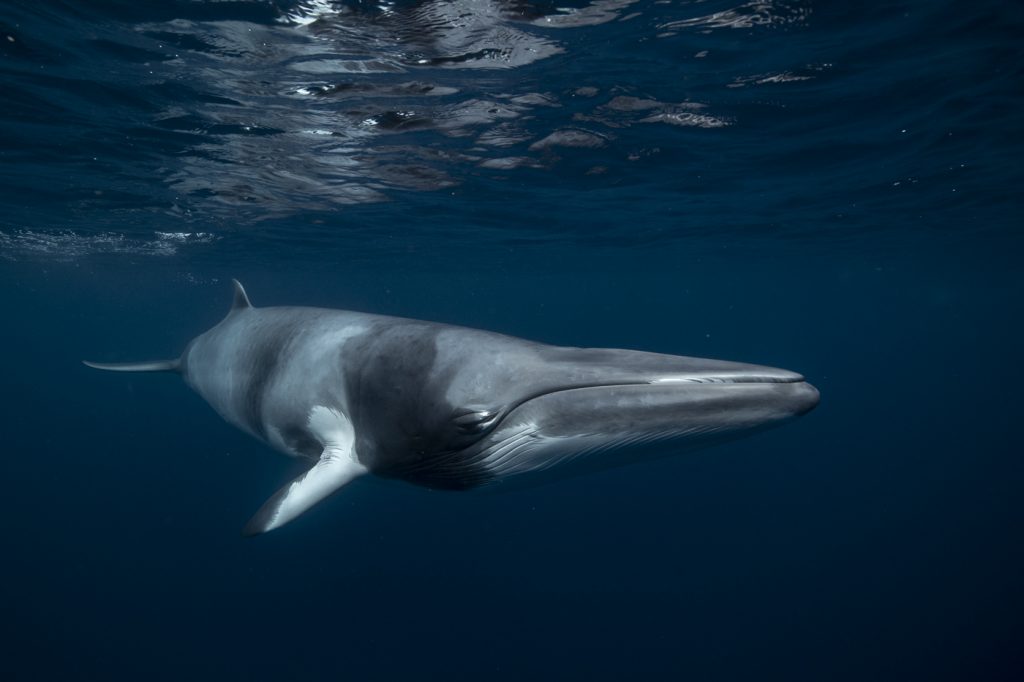We want to leave a positive impact on the places we visit, through contributing to conservation, and giving back to local communities. Whilst on tour, we hope you can take every opportunity to join our staff in our citizen science projects. They are a fun way to learn even more about the local species, whilst contributing valuable data to science.
Tonga
Tongan Fluke Collective
The underside of an adult humpback whales tail, or “fluke”, is as unique as a fingerprint. Scientists can use fluke shots from all over the world to track whale movement, breeding, and to continue to learn how to best protect our marine mammals. The Tongan Fluke Collective was started by Scott Portelli in 2014, and is library of Tongan humpback whale fluke shots that is freely available to scientists and researchers. Every season at Swimming With Gentle Giants we collect fluke shots for science, and our staff can show you how to do this too! We also submit them to the global Happy Whale database.
Coral Watch
Coral Watch is a citizen science programme established in 2002 by the University of Queensland, Australia. Anyone can get involved, no training needed! Using their simple colour-monitoring chart, we are able to provide Coral Watch with data about the health of Tonga’s coral reefs. What’s great about this, is that we can seamlessly integrate this fun and educational experience into our whale-swim days. Our Marine Biologist & guides will show you how it’s done.
Shots from our 2024 Coral Watch project with Marine Scientist Pablo Fuenzalida. (Photographed by Sophie Kalkowski-Pope.)
Harbour Clean-ups
Join us for a beach or harbour clean-up, and join a global movement to keep our waterways trash free. Every piece of litter we collect is one less that will cause harm in our oceans. We log the data about our trash with the Tangaroa Blue Foundation, a global database which helps in the fight against marine debris.
EBird
With EBird, we can transform our bird sightings into conservation & science, whilst learning more about the species we see here on Vava’u.
INaturalist
INaturalist is a useful citizen science tool, which serves a variety of purposes. If you have a photograph of a critter, but not 100% sure on it’s species, the millions of scientists on INaturalist will come up with an identification for you. And by uploading your photos with location and date, you are also generating research-grade data for science and conservation. Once you’ve started logging species….. you’ll want to continue using INaturalist wherever in the world life takes you!
Sharkbook
If we are lucky enough to spot a shark, especially a whaleshark or leopard shark, we will try to snap some photos of their sides so we can upload it to the global Sharkbook database.
Supporting Local Schools & Library
The local community welcomes reading books for young children, as well as books for teenagers – all in English. Do you have one at home your kids/grandkids/nieces/nephews or friends have finished with? If so, pack it in your bag, and it will be welcomed by our local schools. Blank exercise books are also welcome. If you bring donations, let us know and we will ensure they get to where they are wanted.
Fostering Future Leaders in the Underwater World
Through working with the Our World Underwater Scholarship Society, we support and provide opportunities for young people who are on a pathway to a career in an ocean-conservation, eco-tourism or science-related field.

Left: Melinda working on the Tongan Fluke Collective library. Right: Pablo leading the Coral Watch Programme.
Norway
Norwegian Orca Survey
Norwegian Orca Survey is a non-profit organization dedicated to researching and monitoring orcas in Norway. Using ground-breaking research methods and photo identification, they gather much-needed data for orca conservation. In support of their research we donate an amount for each passenger that travels to Norway with us. On board, you will receive more information about the ways you can help the Norwegian Orca Survey research while in Norway.
We contribute to the research, conservation and monitoring of the Norwegian Orca population. We encourage you to get involved with this during you time with us, by photographing the grey saddle patch adjacent to the dorsal fin, and submitting them to the Norwegian Orca Survey. These photos will be used to identify, track and learn more about these Orca’s lives.
Great Barrier Reef
Minke Whale Project
The Great Barrier Reef is the only known predictable aggregation site for dwarf minke whales in the world! This makes it an incredibly special place to visit. Identification photos of dwarf minkes are greatly appreciated by the Minke Whale Project. They research into dwarf minke whale biology and behaviour, the social and economic values of the whales and the sustainable management of swim-with-whales tourism.
Sea Legacy
Working with the Sea Legacy organisation over the past few years to support the ongoing commitment to saving our oceans we have gained valuable insight and experience on how to document wildlife with the aim of supporting science and government. Our aim is to build a healthy future for our oceans through education.












